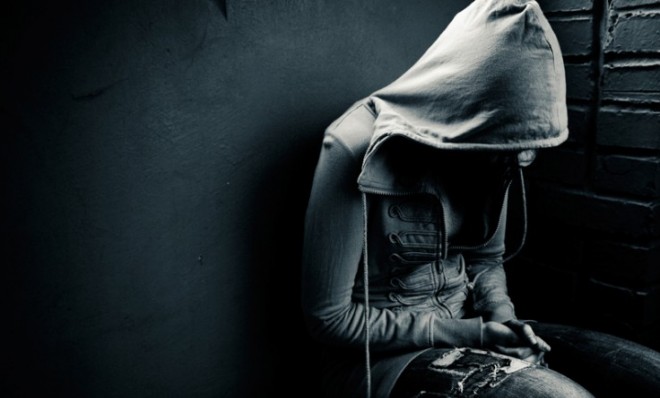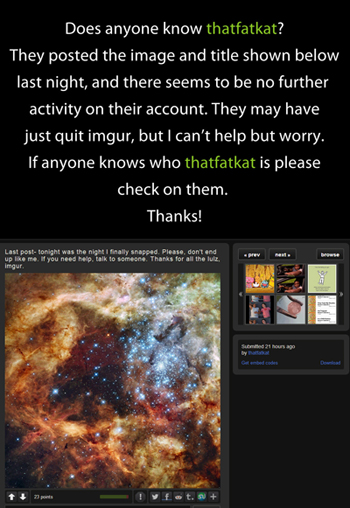Can a brain-twisting smartphone game help combat depression?
A Harvard researcher hopes a little cognitive dissonance will help keep those suffering from depression emotionally healthy

A free daily email with the biggest news stories of the day – and the best features from TheWeek.com
You are now subscribed
Your newsletter sign-up was successful
This morning on Imgur — which I was browsing for work purposes, I swear — I came across something that stood out from the ordinary shuffle of cat pictures and played-out memes. This:

Another Imgurian apparently contacted a family member of thatfatkat on Twitter to check up on her. Later in the comments, she admits to swallowing "a whole bottle of medication" in a moment of darkness.
The short of it is — without ascribing any diagnosis to the Imgur user's particular situation — depression and other mental-health issues are serious problems with no easy solutions. According to the Anxiety and Depression Association of America (ADAA), anxiety disorders affect 40 million adults in the United States, or about 18 percent of the overall population. Treatment of these illnesses takes a significant economic toll, too: The U.S spends an estimated $42 billion a year fighting the disease, according to a study published in The Journal of Clinical Psychiatry.
The Week
Escape your echo chamber. Get the facts behind the news, plus analysis from multiple perspectives.

Sign up for The Week's Free Newsletters
From our morning news briefing to a weekly Good News Newsletter, get the best of The Week delivered directly to your inbox.
From our morning news briefing to a weekly Good News Newsletter, get the best of The Week delivered directly to your inbox.
Aside from expensive psychotherapy, the only other way to fight depression from a neurological standpoint is with medication — brand-name antidepressants like Prozac and Zoloft. These, of course, have all sorts of nasty side effects and cost upwards of $50 a bottle. But what if there were a way for depression-prone individuals to receive a treatment that wouldn't further scramble their brains? More specifically, what if there were a way to treat those suffering from the disorder with something innocuous, like, say, a video game?
In a fascinating story in Popular Science, a Harvard neuroscientist sets out to do just that. Meet Diego Pizzagalli, director of the university's Neuroimaging Center and the Center for for Depression, Anxiety, and Stress Research. In 2001, he published a number of important papers on depression concerning the existence of "biomarkers" — little response signals in the brain that light up when a patient receives medication or therapy.
Now, Pizzagalli is working with a Baltimore-based startup incubator called Canterbury Road Partners to apply his research into developing games that exercise areas of the brain associated with depression, kind of like Lumosity — a web-based app that uses games to improve cognitive skills — but explicitly for anxiety disorders. The new business, BrainTracer, is looking for investors for its first-ever prototype app: MoodTune.
MoodTune, at least at this early stage, doesn't look anywhere near as fun as Angry Birds or Temple Run. It simply lacks the polish. Instead, for 15 to 20 minutes every day, you play a series of quick-fire brain puzzles that are designed to either create emotional or cognitive conflict. According to Popular Science, this cognitive dissonance works a lot like resistance training to keep gray matter — in particular, the anterior cingulate cortex, an area associated with depression — in tip-top shape.
A free daily email with the biggest news stories of the day – and the best features from TheWeek.com
For example, in one of the games, the player simply indicates if the color of the word matches what the word actually spells. (The word "red" flashes in a green font, for example. See a few samples here.) At the end, stats are collected on a player's dashboard to track things like games played, their responsiveness, and most importantly, their mood. In theory, this should do wonders for the mental health of at-risk depressives.
When BrainTracer eventually releases its program, it plans on using a tiered pricing model, ranging from $30 to $50 monthly — not exactly cheap, but more affordable than most brain medications. The question then becomes: Does something like MoodTune actually work? The evidence against supposed brain-boosting programs like Lumosity says no. But with Pizzagalli, BrainTracer has a credible neuroscientist building its foundation.
Read more about BrainTracer's fight against depression at Popular Science. Or if you're already convinced, head over to Indiegogo to help the company reach its $152,000 funding goal.
-
 How the FCC’s ‘equal time’ rule works
How the FCC’s ‘equal time’ rule worksIn the Spotlight The law is at the heart of the Colbert-CBS conflict
-
 What is the endgame in the DHS shutdown?
What is the endgame in the DHS shutdown?Today’s Big Question Democrats want to rein in ICE’s immigration crackdown
-
 ‘Poor time management isn’t just an inconvenience’
‘Poor time management isn’t just an inconvenience’Instant Opinion Opinion, comment and editorials of the day